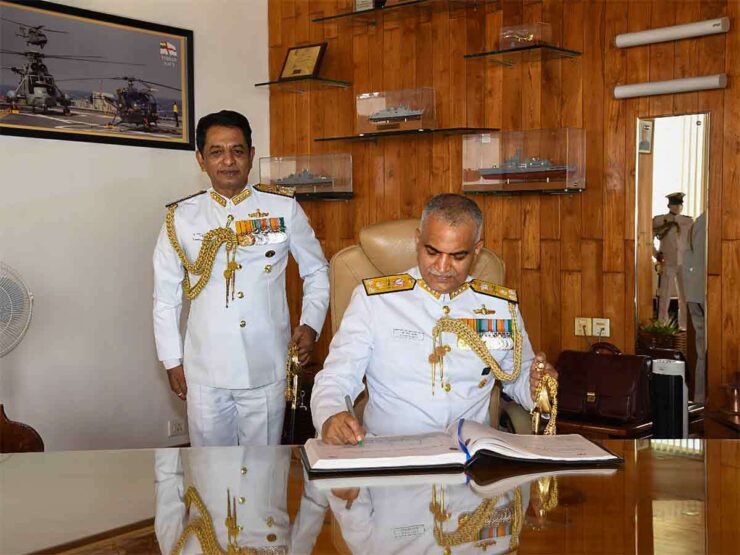
New Delhi: Asserting that Indian Navy was “fully confident of defending India’s maritime interests,” Navy Chief Admiral R. Hari Kumar assured the nation that it “stands ready to deal with any security challenge.”
Addressing the media ahead of Navy Day December 4, he said the Indian Navy is carrying out acquisition of hardware and platforms in keeping with the security challenges facing the nation.
On China and its more than 350-ship strong People’s Liberation Army-Navy, he said the Indian Navy was keeping track of Chinese forays into the Indian Ocean region, and added that Beijing’s activities and that of Pakistan are closely watched.
On the creation of theatre commands – i.e. integrating units of the army, navy and air force – Admiral Kumar described the decision to form such commands and the creation of the post of chief of defence staff (CDS) as the “single most important higher defence reform” since India’s independence in 1947.
Admiral Kumar who took charge as the 25th Chief of Naval Staff on November 30, said that the details of the proposed maritime command are being worked out and indicated that its basic structure could come up by next year.
“There is clear dissemination of national policy, there is greater awareness of national security challenges, direct responsibility and accountability to the political executive, faster decisions, faster approvals, much reduced processing time, handling of subjects by subject matter experts and fewer layers of bureaucracy,” he said.
“I find that the Department of Military Affairs has made a substantial difference to the way armed forces process issues at headquarters,” he said.
Asked about differences within the three wings of the defence forces on the creation of theatre commands, the Navy Chief said “jointness and integration is not something that can happen in a very short time.” He pointed to the case of the US where the decision to integrate the three services into theatre commands took decades.
“It is a complicated process, it’s not something that can be put together in a very short time,” he said.
In the case of the maritime command, Admiral Kumar said, the charter will largely be operational. It would have a limited administrative or maintenance role with all aspects of operations handled by the command. The role of the service chief would be limited but since he would be part of the Chiefs of Staff Committee, the service chief would be informed of the operations undertaken by the theatre command, he said.
On the Indo-Pacific and the role of the Indian Navy, the Navy chief said that the region had great significance for India given that $ 200 billion of trade passed through the waters of the Indo-Pacific. Indian diaspora had a strong presence along the littorals, he said.
On the Chinese Navy adding vessels to its fleet on a regular basis – making it one of the largest navies in the region with as many as 355 ships – Admiral Kumar said that India did not look at “capability development against any particular country.”
“We develop our capability based on our maritime interest. Therefore our planning, preparedness, everything is to ensure how we preserve, promote and protect our maritime interest,” he said. The Navy currently has 130 ships and had earlier planned to achieve securing 200 ships, which was revised to 170 ships by 2027.
The Navy Chief said Indian warships were deployed at forward positions during the border clashes with China at the Line of Actual Control in Eastern Ladakh, pointing out that the security situation at the northern borders has added to the challenges India faces.
On the presence of Chinese warships’ in the Indian Ocean Region, Admiral Kumar said that on an average there are seven Chinese PLA Navy ships. They also send their submarines sometimes.
“We are aware about their (Chinese) ships deployment. We also plan our strategy keeping everything in mind,” said Admiral Kumar adding, “We have kept Chinese ships under close surveillance, and we continue to do that even now.”
On the strength of the Chinese Navy, the Admiral said they have constructed 180 ships in the last 10 years. On the Indian Navy’s strength, he said the Indian Navy has evolved from 33 ships to “where we are today. We develop our capability based on our maritime interests not what others are doing.”
He said 39 warships and submarines are being constructed and 37 of them are being built in Indian shipyards. Detailing about the ships’ induction into the fleet, he said in the last seven years 28 ships were commissioned.
Talking about unmanned systems, Admiral Kumar said: “We have a ten-year road map with a plan to have indigenous unmanned airborne, underwater and autonomous systems.”
He appreciated the government’s decision to create a Department of Military Affairs, saying, “the creation of the Department of Military Affairs is the biggest reform in the military since independence along with the creation of the post of CDS. This enables faster decision-making and fewer layers of bureaucracy.”









